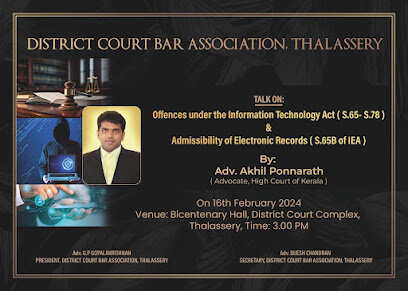Best Arrests & Searches Lawyers in Kannur
Share your needs with us, get contacted by law firms.
Free. Takes 2 min.
List of the best lawyers in Kannur, India
About Arrests & Searches Law in Kannur, India
Arrests and searches are crucial aspects of criminal procedure law in Kannur, India, as governed by the Indian Constitution, the Code of Criminal Procedure, 1973 (CrPC), and other relevant statutes. The law aims to balance the state's responsibility to maintain law and order with protecting individual rights and liberties. The police and other law enforcement agencies have specific legal powers and restrictions on arresting individuals and conducting searches of persons or premises. These laws ensure that the citizens’ fundamental rights, especially the right to personal liberty and privacy, are safeguarded against unlawful or arbitrary state action. In Kannur, as in the rest of India, these legal processes must adhere strictly to prescribed procedures.
Why You May Need a Lawyer
If you or someone you know is involved in a matter related to arrest or search-whether as a suspect, accused, victim, or even a bystander-a lawyer can provide valuable assistance. Common situations where legal help is important include:
- Being arrested or detained by the police
- Your home, workplace, or vehicle being searched by authorities
- Receiving a notice or sum and substance of police inquiry
- Violation of your rights during search or arrest (e.g., no warrant, no female officer, lack of proper documentation)
- Needing to secure bail or anticipatory bail
- Assisting a friend or family member who has been arrested in Kannur
- Facing harassment or abuse of power by authorities during a search or arrest
- Challenging an illegal or wrongful arrest/search in court
- Collecting evidence or filing complaints about misconduct by police or government officials
Local Laws Overview
Kannur, like other parts of Kerala, is governed by India’s central criminal statutes, notably the Code of Criminal Procedure, 1973 (CrPC), and the Indian Penal Code (IPC). Key aspects include:
- Procedure for Arrest: Section 41 of CrPC specifies when police can arrest without a warrant. Police must inform the accused of the grounds of arrest and their right to bail where applicable.
- Mandatory Documentation: Police are required to prepare a list of items seized and provide a copy to the person present at the time of search; arrest and search memos must be signed by witnesses.
- Search and Seizure: Search warrants are usually required, except in emergencies involving cognizable offences. Searches of women must be conducted by female officers.
- Rights of Arrested Persons: Accused persons have the right to inform relatives/friends, the right to legal counsel, and must be produced before a magistrate within 24 hours of arrest (excluding travel time).
- Preventive Detention: In specific situations, laws like the Kerala Anti-Social Activities (Prevention) Act may permit preventive detention, but with statutory safeguards.
- Role of Local Police: Kannur police functions under Kerala Police Act, local police station practices may vary but must abide by central laws.
- Searches During Investigations: Police need to follow proper procedure under Sections 100, 165, and 166 of CrPC regarding searches of premises/persons.
- Special Laws: Certain cases (e.g., narcotics or anti-terror) involve special procedures under acts like the NDPS Act or UAPA.
Frequently Asked Questions
What should I do if I am arrested in Kannur?
Stay calm and do not resist. Ask the police for the reason of your arrest and request to inform your family or lawyer. You have a right to counsel and must be presented before a magistrate within 24 hours. Request to see the arrest memo and ensure a copy is given to your relative/friend.
Can the police search my house without a warrant?
Police generally need a search warrant issued by a magistrate, except in certain exceptional situations involving cognizable offences or urgent danger. They must document the search, allow you or a witness to be present, and provide a list of seized items.
Do I have a right to legal representation during arrest or search?
Yes. Both the Constitution of India (Article 22) and the CrPC guarantee your right to be defended by a lawyer of your choice from the moment of arrest.
Can women be searched by male police officers?
No. Searches of women can only be conducted by female police personnel, and with strict regard for decency.
What is anticipatory bail and when can I apply for it?
Anticipatory bail is a legal provision to seek protection against arrest in anticipation of being accused in a non-bailable offence. You can apply to the local Sessions Court or High Court if you fear arrest.
What should I do if police mistreat or harass me during arrest or search?
You can file a complaint with the Superintendent of Police, Human Rights Commission, or approach the Magistrate. It is advisable to consult a lawyer to assess the best course of action and protect your rights.
Can the police detain me without filing a case?
No. Police must have legitimate grounds for detention/arrest and must produce you before a magistrate within 24 hours, except under specific preventive detention laws, which also have safeguards.
Are searches of vehicles allowed without a warrant?
In certain situations, such as suspected drunk driving, transporting contraband, or immediate threat suspicions, police can search vehicles without a warrant. However, all searches must be lawful and properly documented.
Can I get a copy of the arrest/search memo or list of seized items?
Yes. Police are required by law to provide you or your nominated person with a copy of these documents after any arrest or search.
What rules do police have to follow during a search?
Police must act respectfully, show proper identification, conduct searches ideally during daytime, and include two or more independent witnesses (usually local residents) during the search. If any belongings are seized, they should issue a receipt to you.
Additional Resources
- Kerala State Legal Services Authority (KELSA): Provides free legal aid and guidance regarding arrests and searches in Kerala, including Kannur.
- Police Station Help Desks: Most Kannur police stations have legal aid cells or officers responsible for citizen complaints about arrest and search procedures.
- Kannur Bar Association: Qualified local lawyers specializing in criminal law are available for consultation.
- District Human Rights Commission: For complaints about abuse or illegal actions by police during arrest or search.
- District Magistrate’s Office: For filing complaints or seeking relief against illegal actions by authorities.
- Online Portals: Kerala Police and Kerala State Government websites often publish guidelines and resources relevant to arrest and search rights.
Next Steps
If you need legal assistance regarding an arrest or search in Kannur:
- Gather all documents and details related to your case, such as arrest/search memos, FIRs, or notices received.
- Consult a local lawyer-especially those with experience in criminal law or human rights. The Kannur Bar Association is a good place to start.
- If you cannot afford a lawyer, apply for free legal aid through Kerala State Legal Services Authority (KELSA).
- If you believe your rights have been violated, lodge a complaint with the responsible police authorities or Human Rights Commission.
- Follow your lawyer’s advice strictly, and avoid making written or verbal statements to authorities without legal counsel present.
- Keep your family informed of all developments and ensure they know your legal representatives.
Lawzana helps you find the best lawyers and law firms in Kannur through a curated and pre-screened list of qualified legal professionals. Our platform offers rankings and detailed profiles of attorneys and law firms, allowing you to compare based on practice areas, including Arrests & Searches, experience, and client feedback.
Each profile includes a description of the firm's areas of practice, client reviews, team members and partners, year of establishment, spoken languages, office locations, contact information, social media presence, and any published articles or resources. Most firms on our platform speak English and are experienced in both local and international legal matters.
Get a quote from top-rated law firms in Kannur, India — quickly, securely, and without unnecessary hassle.
Disclaimer:
The information provided on this page is for general informational purposes only and does not constitute legal advice. While we strive to ensure the accuracy and relevance of the content, legal information may change over time, and interpretations of the law can vary. You should always consult with a qualified legal professional for advice specific to your situation.
We disclaim all liability for actions taken or not taken based on the content of this page. If you believe any information is incorrect or outdated, please contact us, and we will review and update it where appropriate.












